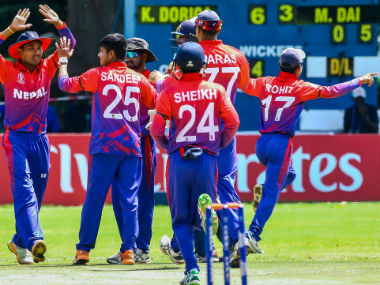Nepal made history on Thursday as they gained ODI status after beating Papua New Guinea (PNG) by six wickets in the World Cup Qualifier play-off at the Old Hararians Sports Club. [caption id=“attachment_4392463” align=“alignleft” width=“380”]  Nepal cricket team celebrate a PNG wicket. Image Courtesy: Twitter @ICC[/caption] In a dominating display, Nepal made sure PNG doesn’t score much in the first innings by bowling them out for a paltry 114 in 27.2 overs. 17-year-old leg-spinner Sandeep Lamichhane and Dipendra Airee were the standout performance with the ball, picking four wickets each. None of the PNG players could cross the 20-run mark in their innings with the highest score being 19 by Charles Amini. In reply, Nepal reached the target in the 23rd over, losing just four wickets in the process. Airee continued his good form with the bat as well as he scored an unbeaten half-century to ensure that Nepal would become an ODI team until at least 2022, with Papua New Guinea losing their elite status. Nepal’s rise has been tremendous considering they were in the World Cricket League Division Five as recently as 2010, while their cricket association has been suspended by the ICC since 2016. Although the ban doesn’t affect on-field matters. The other play-off game saw Hong Kong lose their ODI place after a defeat by the Netherlands. With inputs from AFP
Nepal made history on Thursday as they gained ODI status after beating Papua New Guinea (PNG) by six wickets in the World Cup Qualifier play-off at the Old Hararians Sports Club.
Advertisement
End of Article


)

)
)
)
)
)
)
)
)



